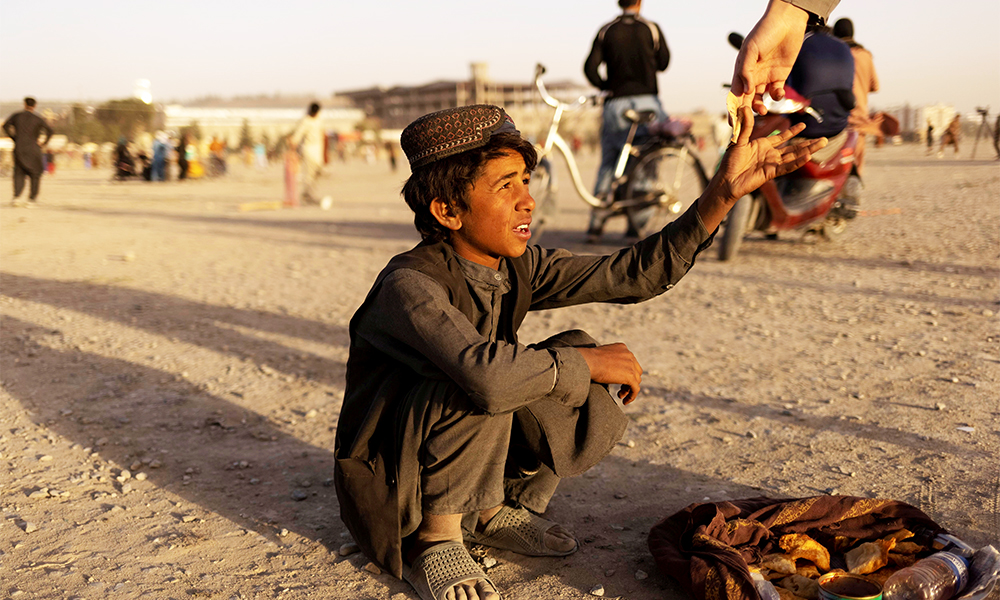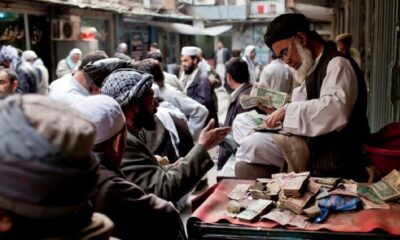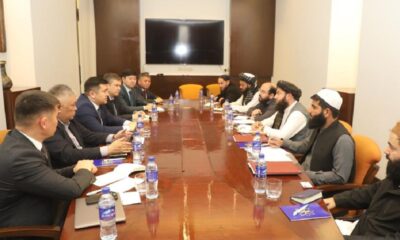Latest News
Record levels of hunger persist in Afghanistan, WFP warns in latest report

Almost half of Afghanistan’s population – 19.7 million – are facing acute hunger according to the latest Integrated Food Security Phase Classification (IPC) analysis conducted in January and February this year by food security cluster partners of the United Nations.
The report, published on Monday, predicts that the outlook for June to November this year sees a slight improvement in the food security situation, with a reduction in the number of people facing acute food insecurity to 18.9 million people.
This is due in part to the coming wheat harvest from May to August, and this year’s well-coordinated scale-up of humanitarian food assistance – alongside increased agricultural livelihood support.
However, gains will be limited – the report warns.
Lingering drought and the deep economic crisis mean that unprecedented hunger will continue to threaten the lives and livelihoods of millions of people across Afghanistan.
“Of particular concern – and for the first time since the introduction of the IPC in Afghanistan in 2011 – a small pocket of ‘catastrophic’ levels of food insecurity – or IPC Phase 5 – has been detected in the country,” the World Food Program (WFP) reported.
“More than 20,000 people in the north-eastern province of Ghor are facing catastrophic levels of hunger because of a long period of harsh winter and disastrous agricultural conditions.
Unprecedented levels of humanitarian assistance focused on bolstering food security have made a difference. But the food security situation is dire, the report stated.
“Humanitarian assistance remains desperately important, as do the needs to rebuild shattered agricultural livelihoods and re-connect farmers and rural communities to struggling rural and urban markets across the country. Unless these happen, there will be no way out of this crisis,” said Richard Trenchard, FAO Representative in Afghanistan.
“Food assistance and emergency livelihood support are the lifeline for the people of Afghanistan. We mounted the world’s largest humanitarian food operation in a matter of months, reaching more than 16 million people since August 2021,” said Mary-Ellen McGroarty, WFP’s Country Director and Representative in Afghanistan.
“We are working with farmers, millers, and bakeries, training women and creating jobs to support the local economy. Because the people of Afghanistan would much prefer jobs; women want to be able to work; and all girls deserve to go to school. Allowing the economy to function normally is the surest way out of the crisis, otherwise suffering will grow where crops cannot,” she added.
The upcoming harvest will bring some relief to millions of families struggling with income losses and food shortages.
However, for many, the harvest will only offer short-term relief and very little opportunity for recovery.
In addition to this, the war in Ukraine continues to put pressure on Afghanistan’s wheat supply, food commodities, agricultural inputs, and fuel prices. Access to seeds, fertilizer and water for irrigation is limited, labour opportunities are scarce and enormous debts have been incurred to buy food over the last few months.
Both FAO and WFP continue to scale up their programmes across the country. WFP has reached more than 16 million people so far in 2022 with emergency food assistance, and is supporting local markets, working with retailers and local suppliers. WFP continues to invest in people’s livelihoods through skills training and climate adaption projects so that families can cultivate their land and grow their own food.
FAO continues to scale up its assistance to farmers and herders in rural areas and will assist more than nine million people in 2022 through a range of interventions supporting crop, livestock and vegetable production, cash transfers and the rehabilitation of vital irrigation infrastructure and systems.
Latest News
Dozens of U.S. lawmakers oppose Afghan immigration freeze after Washington shooting

Sixty-one members of the U.S. Congress have urged the Trump administration to reverse its decision to halt immigration processing for Afghan nationals, warning that the move unfairly targets Afghan nationals following a deadly shooting involving two National Guard members.
In a letter addressed to Secretary of State Marco Rubio and Homeland Security Secretary Kristi Noem, the lawmakers said the incident should not be used to vilify Afghans who are legally seeking entry into the United States. They stressed that Afghan applicants undergo extensive vetting involving multiple U.S. security agencies.
The letter criticized the suspension of Special Immigrant Visa processing, the termination of Temporary Protected Status for Afghanistan, and broader travel and asylum restrictions, warning that such policies endanger Afghan allies who supported U.S. forces during the war.
“Exploiting this tragedy to sow division and inflame fear will not make America safer. Abandoning those who made the courageous choice to stand beside us signals to those we may need as allies in the future that we cannot be trusted to honor our commitments. That is a mistake we cannot afford,” the group said.
The U.S. admitted nearly 200,000 Afghan nationals in the wake of the U.S. withdrawal from Afghanistan.
Thousands of Afghans who worked with the U.S. military and their families still wait at military bases and refugee camps around the world for a small number of SIVs.
Latest News
Magnitude 5.3 earthquake strikes Afghanistan – USGS

An earthquake of magnitude 5.3 struck Afghanistan on Friday, the United States Geological Survey (USGS) said.
The quake occurred at 10:09 local time at a depth of 35 km, USGS said.
Its epicentre was 25 kilometres from Nahrin district of Baghlan province in north Afghanistan.
Latest News
Chairman of US House intel panel criticizes Afghan evacuation vetting process

Chairman of U.S. House intelligence committee, Rick Crawford, has criticized the Biden administration’s handling of Afghan admissions to the United States following the 2021 withdrawal from Afghanistan.
In a statement, Crawford said that alongside large numbers of migrants entering through the U.S. southern border, approximately 190,000 Afghan nationals were granted entry under Operation Allies Welcome after the U.S. military withdrawal. He claimed that many of those admitted lacked proper documentation and, in some cases, were allowed into the country without comprehensive biometric data being collected.
Crawford said that the United States had a duty to protect Afghans who worked alongside U.S. forces and institutions during the two-decade conflict. However, he argued that the rapid and poorly coordinated nature of the withdrawal created conditions that overwhelmed existing screening and vetting systems.
“The rushed and poorly planned withdrawal created a perfect storm,” Crawford said, asserting that it compromised the government’s ability to fully assess who was being admitted into the country.
He said that there 18,000 known or suspected terrorists in the U.S.
“Today, I look forward to getting a better understanding of the domestic counterterrorism picture, and hearing how the interagency is working to find, monitor, prosecute, and deport known or suspected terrorists that never should have entered our country to begin with,” he said.
The Biden administration has previously defended Operation Allies Welcome, stating that multiple layers of security screening were conducted in coordination with U.S. intelligence, defense, and homeland security agencies. Nonetheless, the evacuation and resettlement of Afghan nationals remains a contentious political issue, particularly amid broader debates over immigration and border security.
U.S. President Donald Trump’s administration recently ordered its diplomats worldwide to stop processing visas for Afghan nationals, effectively suspending the special immigration program for Afghans who helped the United States during its 20-year-long occupation of their home country.
The decision came after a former member of one of Afghanistan’s CIA-backed units was accused of shooting two U.S. National Guard soldiers in Washington, D.C.
-

 Latest News4 days ago
Latest News4 days agoGermany speeds up admission of Afghans from Pakistan
-

 Sport4 days ago
Sport4 days agoIPL 2026 Auction set for Abu Dhabi with $28.6 million purse at stake
-

 Business5 days ago
Business5 days agoAfghan economy posts second year of growth despite deep structural challenges
-

 Latest News4 days ago
Latest News4 days agoAfghanistan to establish independent oil and gas authority
-

 Sport5 days ago
Sport5 days agoATN to broadcast ‘The Best FIFA Football Awards 2025’
-

 Latest News4 days ago
Latest News4 days agoUS intelligence chief warns of ‘direct threat’ from suspected terrorists inside the country
-

 Latest News3 days ago
Latest News3 days agoIEA supreme leader stresses enforcement of Sharia law and sincere public service
-

 International Sports4 days ago
International Sports4 days agoILT20: Desert Vipers qualify for playoffs with five-wicket win over Dubai Capitals

























